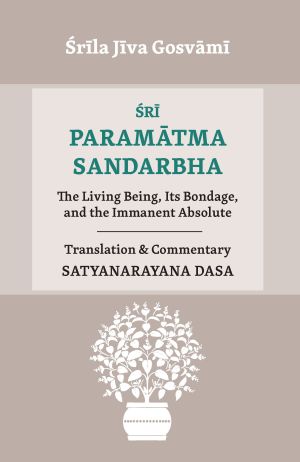Śrī Paramatma Sandarbha Classes
The third book of the Ṣaṭ Sandarbhas, Śrī Paramātmā Sandarbha, is an elaborate essay on the nature of Paramātmā. The distinction between Absolute Reality’s manifestations as Paramātmā and Bhagavān is relatively unknown, even to specialists in the field of Vedānta. These two specific designations are often used synonymously to refer to a single aspect of the tattva. It was Śrī Jīva Gosvāmī’s genius to clearly define them and enumerate their characteristics and functions in detail. There is no other work in the entire gamut of Indian theological and philosophical literature that throws light on this subject so lucidly.
Paramātmā, also called Puruṣa, is akin to what people usually conceive of as God, the creator and overseer of the cosmos, whereas Bhagavān is God in His supreme transcendence, without reference to the phenomenal world — God in His own intrinsic being. Paramātmā is the regulator of the intermediary potency (taṭasthā-śakti) and the extrinsic potency (bahiraṅgā-śakti), otherwise known as māyā. He is never influenced by this extrinsic potency, even while present in the midst of it.
Paramātmā Sandarbha is the most philosophical of the Six Sandarbhas, and it demands focused attention and an unbiased attitude on the part of the reader. Anyone who is willing to take up this challenge will reap rich benefits from Śrī Jīva’s profound knowledge and unique insight into the above subjects.
description taken from Jiva Institute
119 Lectures in Series
- 180414 Paramatma Sandarbha, Introduction, Part 1Ananda Ashrama, Saragrahi, NC on April 14, 2018
- 180417 Paramatma Sandarbha, Introduction, Part 2Ananda Ashrama, Saragrahi, NC on April 17, 2018
- 180419 Paramatma Sandarbha, Anuccheda 1.1, part 1Ananda Ashrama, Saragrahi, NC on April 19, 2018
- 180421 Paramatma Sandarbha, Anuccheda 1.1, part 2Ananda Ashrama, Saragrahi, NC on April 21, 2018
- 180612 Paramatma Sandarbha, Anuccheda 1.2, part 1Ananda Ashrama, Saragrahi, NC on June 12, 2018
- 180614 Paramatma Sandarbha, Anuccheda 1.2, part 2Ananda Ashrama, Saragrahi, NC on June 14, 2018
- 180616 Paramatma Sandarbha, Anuccheda 1.2, part 3Ananda Ashrama, Saragrahi, NC on June 16, 2018
- 180619 Paramatma Sandarbha, Anuccheda 1.3, part 1Ananda Ashrama, Saragrahi, NC on June 19, 2018
- 180621 Paramatma Sandarbha, Anuccheda 1.3, part 2Ananda Ashrama, Saragrahi, NC on June 21, 2008
- 180623 Paramatma Sandarbha, Anuccheda 2, part 1Ananda Ashrama, Saragrahi, NC on June 23, 2018
- 180626 Paramatma Sandarbha, Anuccheda 2-3Ananda Ashrama, Saragrahi, NC on June 26, 2018
- 180628 Paramatma Sandarbha, Anuccheda 4-8Ananda Ashrama, Saragrahi, NC on June 28, 2018
- 180630 Paramatma Sandarbha, Anuccheda 8-11Ananda Ashrama, Saragrahi, NC on June 30, 2018
- 180706 Paramatma Sandarbha, Anuccheda 12Ananda Ashrama, Saragrahi, NC on July 6, 2018
- 180707 Paramatma Sandarbha, Anuccheda 13Ananda Ashrama, Saragrahi, NC on July 7, 2018
- 180710 Paramatma Sandarbha, Anuccheda 14-15Ananda Ashrama, Saragrahi, NC on July 10, 2018
- 180712 Paramatma Sandarbha, Anuccheda 16-17Ananda Ashrama, Saragrahi, NC on July 12, 2018
- 180714 Paramatma Sandarbha, Anuccheda 17, part 2Ananda Ashrama, Saragrahi, NC on July 14, 2018
- 180717 Paramatma Sandarbha, Anuccheda 17, part 3Ananda Ashrama, Saragrahi, NC on July 17, 2018
- 180719 Paramatma Sandarbha, Anuccheda 18-19Ananda Ashrama, Saragrahi, NC on July 19, 2018
- 180721 Paramatma Sandarbha, Anuccheda 19, part 2Ananda Ashrama, Saragrahi, NC on July 21, 2018
- 180728 Paramatma Sandarbha, Anuccheda 19, part 3Ananda Ashrama, Saragrahi, NC on July 28, 2018
- 180731 Paramatma Sandarbha, Anuccheda 19, part 4Ananda Ashrama, Saragrahi, NC on July 31, 2018
- 180804 Paramatma Sandarbha, Anuccheda 19, part 5Ananda Ashrama, Saragrahi, NC on August 4, 2018
- 180807 Paramatma Sandarbha, Anuccheda 20-22Ananda Ashrama, Saragrahi, NC on August 7, 2018
- 180809 Paramatma Sandarbha, Anuccheda 22, part 2Ananda Ashrama, Saragrahi, NC on August 9, 2018
- 180811 Paramatma Sandarbha, Anuccheda 23-24Ananda Ashrama, Saragrahi, NC on August 11, 2018
- 180814 Paramatma Sandarbha, Anuccheda 25-27Ananda Ashrama, Saragrahi, NC on August 14, 2018
- 180816 Paramatma Sandarbha, Anuccheda 27, part 2Ananda Ashrama, Saragrahi, NC on August 16, 2018
- 180818 Paramatma Sandarbha, Anuccheda 27, part 3Ananda Ashrama, Saragrahi, NC on August 18, 2018
- 180821 Paramatma Sandarbha, Anuccheda 28Ananda Ashrama, Saragrahi, NC on August 21, 2018
- 180823 Paramatma Sandarbha, Anuccheda 29Ananda Ashrama, Saragrahi, NC on August 23, 2018
- 180825 Paramatma Sandarbha, Anuccheda 30 and 31Ananda Ashrama, Saragrahi, NC on August 25, 2018
- 180828 Paramatma Sandarbha, Anuccheda 32Ananda Ashrama, Saragrahi, NC on August 28, 2018
- 180902 Sandarbha overview - JanmastamiAnanda Ashrama, Saragrahi, NC on September 2, 2018
- 180906 Paramatma Sandarbha, Anuccheda 33 and 34Ananda Ashrama, Saragrahi, NC on September 6, 2018
- 180908 Paramatma Sandarbha, Anuccheda 35Ananda Ashrama, Saragrahi, NC on September 8, 2018
- 180911 Paramatma Sandarbha, Anuccheda 35 and 36Ananda Ashrama, Saragrahi, NC on September 11, 2018
- 180913 Paramatma Sandarbha, Anuccheda 37, part 1Ananda Ashrama, Saragrahi, NC on September 13, 2018
- 180915 Paramatma Sandarbha, Anuccheda 37, part 2Ananda Ashrama, Saragrahi, NC on September 15, 2018
- 180918 Paramatma Sandarbha, Anuccheda 37, part 3Ananda Ashrama, Saragrahi, NC on September 18, 2018
- 180920 Paramatma Sandarbha, Anuccheda 38 and 39Ananda Ashrama, Saragrahi, NC on September 20, 2018
- 180922 Paramatma Sandarbha, Anuccheda 40-42Ananda Ashrama, Saragrahi, NC on September 22, 2018
- 180925 Paramatma Sandarbha, Anuccheda 43 and 44Ananda Ashrama, Saragrahi, NC on September 25, 2018
- 180927 Paramatma Sandarbha, Anuccheda 44Ananda Ashrama, Saragrahi, NC on September 27, 2018
- 181108 Paramatma Sandarbha, Anuccheda 45Ananda Ashrama, Saragrahi, NC on November 8, 2018
- 181110 Paramatma Sandarbha, Anuccheda 45-47Ananda Ashrama, Saragrahi, NC on November 10, 2018
- 181113 Paramatma Sandarbha, Anuccheda 47Ananda Ashrama, Saragrahi, NC on November 13, 2018
- 181115 Paramatma Sandarbha, Anuccheda 48Ananda Ashrama, Saragrahi, NC on November 15, 2018
- 181117 Paramatma Sandarbha, Anuccheda 49-52Ananda Ashrama, Saragrahi, NC on November 17, 2018
- 181120 Paramatma Sandarbha, Anuccheda 52-53Ananda Ashrama, Saragrahi, NC on November 20, 2018
- 181122 Paramatma Sandarbha, Anuccheda 53, part 1Ananda Ashrama, Saragrahi, NC on November 22, 2018
- 181124 Paramatma Sandarbha, Anuccheda 53, part 2Ananda Ashrama, Saragrahi, NC on November 24, 2018
- 181127 Paramatma Sandarbha, Anuccheda 54Ananda Ashrama, Saragrahi, NC on November 27, 2018
- 181129 Paramatma Sandarbha, Anuccheda 55, part 1Ananda Ashrama, Saragrahi, NC on November 29, 2018
- 181201 Paramatma Sandarbha, Anuccheda 55, part 2Ananda Ashrama, Saragrahi, NC on December 1, 2018
- 181204 Paramatma Sandarbha, Anuccheda 56-57Ananda Ashrama, Saragrahi, NC on December 4, 2018
- 181206 Paramatma Sandarbha, Anuccheda 58-1, part 1Ananda Ashrama, Saragrahi, NC on December 6, 2018
- 181213 Paramatma Sandarbha, Anuccheda 58-1, part 2Ananda Ashrama, Saragrahi, NC on December 13, 2018
- 181215 Paramatma Sandarbha, Anuccheda 58-2Ananda Ashrama, Saragrahi, NC on December 15, 2018
- 181218 Paramatma Sandarbha, Anuccheda 58-3, part 1Ananda Ashrama, Saragrahi, NC on December 18, 2018
- 181222 Paramatma Sandarbha, Anuccheda 58-3, part 2Ananda Ashrama, Saragrahi, NC on December 22, 2018
- 181225 Paramatma Sandarbha, Anuccheda 58-4, 59Ananda Ashrama, Saragrahi, NC on December 25, 2018
- 181227 Paramatma Sandarbha, Anuccheda 60Ananda Ashrama, Saragrahi, NC on December 27, 2018
- 181229 Paramatma Sandarbha, Anuccheda 61-63Ananda Ashrama, Saragrahi, NC on December 29, 2018
- 190101 Paramatma Sandarbha, Anuccheda 64-65Ananda Ashrama, Saragrahi, NC on January 1, 2019
- 190103 Paramatma Sandarbha, Anuccheda 66Ananda Ashrama, Saragrahi, NC on January 3, 2019
- 190105 Paramatma Sandarbha, Anuccheda 66-67Ananda Ashrama, Saragrahi, NC on January 5, 2019
- 190108 Paramatma Sandarbha, Anuccheda 68-69Ananda Ashrama, Saragrahi, NC on January 8, 2019
- 190110 Paramatma Sandarbha, Anuccheda 70-1Ananda Ashrama, Saragrahi, NC on January 10, 2019
- 190115 Paramatma Sandarbha, Anuccheda 70-1,2Ananda Ashrama, Saragrahi, NC on January 15, 2019
- 190117 Paramatma Sandarbha, Anuccheda 70-2Ananda Ashrama, Saragrahi, NC on January 17, 2019
- 190119 Paramatma Sandarbha, Anuccheda 70-3,4,5Ananda Ashrama, Saragrahi, NC on January 19, 2019
- 190122 Paramatma Sandarbha, Anuccheda 70-6,7Ananda Ashrama, Saragrahi, NC on January 22, 2019
- 190124 Paramatma Sandarbha, Anuccheda 70-8,9, 71-1Ananda Ashrama, Saragrahi, NC on January 24, 2019
- 190126 Paramatma Sandarbha, Anuccheda 71-2,3Ananda Ashrama, Saragrahi, NC on January 26, 2019
- 190129 Paramatma Sandarbha, Anuccheda 71-3,4Ananda Ashrama, Saragrahi, NC on January 29, 2019
- 190131 Paramatma Sandarbha, Anuccheda 72Ananda Ashrama, Saragrahi, NC on January 31, 2019
- 190202 Paramatma Sandarbha, Anuccheda 73-74Ananda Ashrama, Saragrahi, NC on February 2, 2019
- 190205 Paramatma Sandarbha, Anuccheda 75-77Ananda Ashrama, Saragrahi, NC on February 5, 2019
- 190207 Paramatma Sandarbha, Anuccheda 77-78Ananda Ashrama, Saragrahi, NC on February 7, 2019
- 190209 Paramatma Sandarbha, Anuccheda 79-81Ananda Ashrama, Saragrahi, NC on February 9, 2019
- 190212 Paramatma Sandarbha, Anuccheda 82-83Ananda Ashrama, Saragrahi, NC on February 12, 2019
- 190214 Paramatma Sandarbha, Anuccheda 84-85.1Ananda Ashrama, Saragrahi, NC on February 14, 2019
- 190216 Paramatma Sandarbha, Anuccheda 85-86Ananda Ashrama, Saragrahi, NC on February 16, 2019
- 190219 Paramatma Sandarbha, Anuccheda 87-89Ananda Ashrama, Saragrahi, NC on February 19, 2019
- 190221 Paramatma Sandarbha, Anuccheda 90, part 1Ananda Ashrama, Saragrahi, NC on February 21, 2019
- 190223 Paramatma Sandarbha, Anuccheda 90, part 2Ananda Ashrama, Saragrahi, NC on February 23, 2019
- 190226 Paramatma Sandarbha, Anuccheda 90-92Ananda Ashrama, Saragrahi, NC on February 26, 2019
- 190228 Paramatma Sandarbha, Anuccheda 93-1,2Ananda Ashrama, Saragrahi, NC on February 28, 2019
- 190302 Paramatma Sandarbha, Anuccheda 93-3Ananda Ashrama, Saragrahi, NC on March 2, 2019
- 190305 Paramatma Sandarbha, Anuccheda 93-4, part 1Ananda Ashrama, Saragrahi, NC on March 5, 2019
- 190307 Paramatma Sandarbha, Anuccheda 93-4, part 2Ananda Ashrama, Saragrahi, NC on March 7, 2019
- 190309 Paramatma Sandarbha, Anuccheda 93-4, part 3Ananda Ashrama, Saragrahi, NC on March 9, 2019
- 190314 Paramatma Sandarbha, Anuccheda 93-5, part 1Ananda Ashrama, Saragrahi, NC on March 14, 2019
- 190316 Paramatma Sandarbha, Anuccheda 93-5, part 2Ananda Ashrama, Saragrahi, NC on March 16, 2019
- 190319 Paramatma Sandarbha, Anuccheda 94-98Ananda Ashrama, Saragrahi, NC on March 19, 2019
- 190323 Paramatma Sandarbha, Anuccheda 98-99Ananda Ashrama, Saragrahi, NC on March 23, 2019
- 190326 Paramatma Sandarbha, Anuccheda 99-100Ananda Ashrama, Saragrahi, NC on March 26, 2019
- 190328 Paramatma Sandarbha, Anuccheda 100-101Ananda Ashrama, Saragrahi, NC on March 28, 2019
- 190330 Paramatma Sandarbha, Anuccheda 101-102Ananda Ashrama, Saragrahi, NC on March 30, 2019
- 190402 Paramatma Sandarbha, Anuccheda 102-103Ananda Ashrama, Saragrahi, NC on April 2, 2019
- 190404 Paramatma Sandarbha, Anuccheda 103-104Ananda Ashrama, Saragrahi, NC on April 4, 2019
- 190406 Paramatma Sandarbha, Anuccheda 105-1Ananda Ashrama, Saragrahi, NC on April 6, 2019
- 190409 Paramatma Sandarbha, Anuccheda 105-1,2Ananda Ashrama, Saragrahi, NC on April 9, 2019
- 190411 Paramatma Sandarbha, Anuccheda 105-2,3Ananda Ashrama, Saragrahi, NC on April 11, 2019
- 190413 Paramatma Sandarbha, Anuccheda 105-3Ananda Ashrama, Saragrahi, NC on April 13, 2019
- 190416 Paramatma Sandarbha, Anuccheda 105-4Ananda Ashrama, Saragrahi, NC on April 16, 2019
- 190418 Paramatma Sandarbha, Anuccheda 105-4,5Ananda Ashrama, Saragrahi, NC on April 18, 2019
- 190420 Paramatma Sandarbha, Anuccheda 105-5Ananda Ashrama, Saragrahi, NC on April 20, 2019
- 190423 Paramatma Sandarbha, Anuccheda 105-5,6Ananda Ashrama, Saragrahi, NC on April 23, 2019
- 190425 Paramatma Sandarbha, Anuccheda 105-7Ananda Ashrama, Saragrahi, NC on April 25, 2019
- 190427 Paramatma Sandarbha, Anuccheda 105-8,9Ananda Ashrama, Saragrahi, NC on April 27, 2019
- 190604 Paramatma Sandarbha, Anuccheda 105, 9Ananda Ashrama, Saragrahi, NC on June 4, 2019
- 190606 Paramatma Sandarbha, Anuccheda 105, 9-10Ananda Ashrama, Saragrahi, NC on June 6, 2019
- 190608 Paramatma Sandarbha, Anuccheda 105, 10-11Ananda Ashrama, Saragrahi, NC on June 8, 2019
- 190611 Paramatma Sandarbha, Anuccheda 106-107Ananda Ashrama, Saragrahi, NC on June 11, 2019
- 190613 Paramatma Sandarbha, Anuccheda 108-110Ananda Ashrama, Saragrahi, NC on June 13, 2019
- 190615 Paramatma Sandarbha, Anuccheda 110 and ConclusionAnanda Ashrama, Saragrahi, NC on June 15, 2019
Your web browser does not support HTML5 audio. Please update to a newer web browser.
Sastras
Donations Gratefully Accepted



